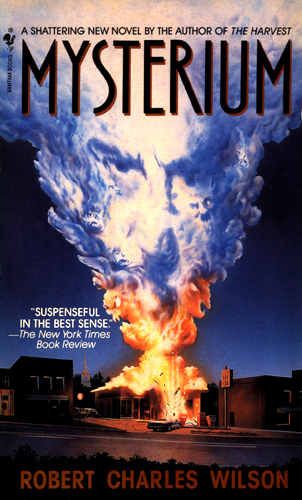 Nobody knows why the government chose the small town of Two Rivers, Michigan, as the site for a top secret military project. Even most of the people involved in the project don’t know what it’s really about. That’s alright, because most of the denizens of this backwoods community are used to minding their own business. But after a mysterious explosion bathes the entire city in light, that becomes impossible.
Nobody knows why the government chose the small town of Two Rivers, Michigan, as the site for a top secret military project. Even most of the people involved in the project don’t know what it’s really about. That’s alright, because most of the denizens of this backwoods community are used to minding their own business. But after a mysterious explosion bathes the entire city in light, that becomes impossible.
On the outskirts of town, all the roads and power lines dead end in ancient virgin forest. It’s as if a perfect circle has been drawn around the town on the map, and everything within the circle has been transported to a parallel world.
A very unfriendly parallel world.
Robert Charles Wilson’s writing is awesome. I could eat up his prose all day. It not only flows beautifully, it’s clear and transparent, to the point where I forget that I’m reading and feel as if I’m there. He always uses the right expression, the right metaphor, and yet his prose never attracts so much attention to itself that it distracts from the story.
I noticed several similarities between Mysterium and Wilson’s other novels that I’ve read. All of them start in our modern world and move into a mysterious, unfamiliar milieu. All of them involve strange religions and religious conflicts. All of them involve male and female characters struggling to face personal relationship problems and eventually coming together. In these ways, this story felt very much like Spin.
At the same time, I can definitely tell that this is one of Wilson’s earlier works. The story flows like a thriller, but lags in certain points. After the town is transported into the parallel dimension, the story seems to meander without any clear direction. For several chapters, I lost the sense of progress that usually accompanies a good plot. The resolution receives very little foreshadowing–the “surprising yet inevitable” element was only “inevitable” three or four chapters from the end. If it weren’t for Wilson’s beautiful writing, I would have put this book down in the middle.
<spoiler alert>
Unlike Spin, I found the milieu of this story somewhat depressing–not necessarily because of the setting itself (though it’s not the kind of alternate present that I’d want to live in), but because the people of Two Rivers never go back.
According to Card, there are two basic types of milieu stories: stories where the protagonist returns profoundly changed, or stories where the protagonist “goes native” and becomes assimilated. But…if the new world isn’t the kind of place you’d want to live in–in other words, if it’s dystopian (and Wilson’s alternate world in Mysterium is fairly dystopian)–then there’s this tension of “will the protagonist make it back? Will they return?” And if they don’t return, the story is emotionally disappointing. That was the case for me with Mysterium.
</spoiler alert>
From this review, it probably sounds like I hated this book. That wasn’t the case–not at all! This was a good story, and I enjoyed it. I finished the last hundred pages at a sprint at 1:30 in the morning–it was definitely that kind of a book. I couldn’t put it down. And at the same time, it was thoughtful and profound (as you can tell from my previous post, “Why I love Robert Charles Wilson“).
I’ve probably said enough. If you like thrilling, parallel world adventure stories with a contemplative, thoughtful “what if?” element, read this book. Even with all the misgivings I’ve mentioned here, it’s good SF. Very good.
Reading it now, about halfway through. Picked it up after your “Why I love RCW” post. It’s still up in the air for me; we’ll see how things finish up.